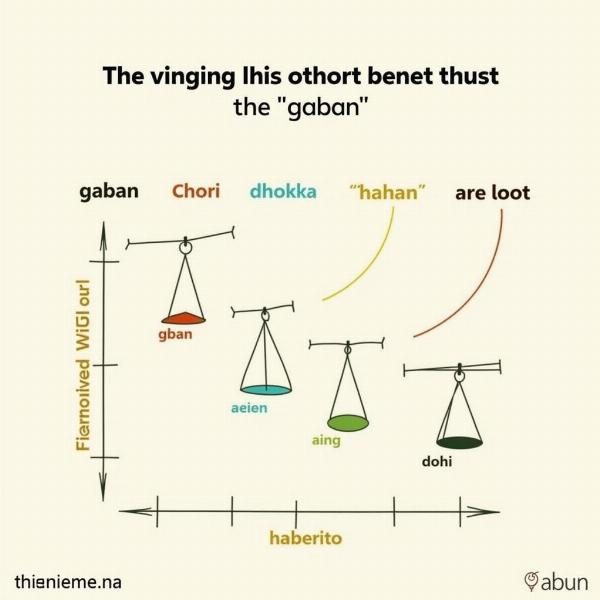The Hindi word “gaban” (ग़बन) carries a weighty meaning, often associated with theft, embezzlement, and misappropriation. Understanding its nuanced implications is crucial for anyone navigating legal, financial, or even everyday conversations in Hindi. This article explores the various meanings of “gaban” in Hindi, its legal ramifications, cultural context, and provides practical examples to solidify your comprehension.
Decoding the Multiple Meanings of Gaban
“Gaban” primarily refers to the act of misappropriating or embezzling something entrusted to one’s care. It’s not simply stealing; it implies a breach of trust. This can range from small-scale pilfering to large-scale financial fraud. The term carries a negative connotation, often evoking a sense of betrayal and dishonesty.
Gaban in Legal Contexts
In legal terms, “gaban” is often used interchangeably with embezzlement. It refers to the fraudulent appropriation of property by a person to whom it has been entrusted. This could be an employee misusing company funds, a trustee mismanaging an estate, or even a public official diverting public resources for personal gain.
Gaban in Everyday Usage
Beyond the legal sphere, “gaban” can also be used in everyday conversations to describe more general acts of theft or misappropriation. For example, you might hear someone say, “Usne mera paisa gaban kar liya” (He embezzled my money), even if the situation doesn’t involve a formal trust agreement.
Understanding the Nuances of Gaban: Beyond Simple Theft
What sets “gaban” apart from words like “chori” (theft) is the element of trust. While “chori” implies outright stealing, “gaban” involves a violation of the trust placed in someone. This adds another layer of gravity to the act. Think of it this way: stealing from a stranger is “chori,” but stealing from a friend is closer to “gaban.”
Gaban and its Cultural Significance
In Indian culture, trust holds immense value. “Gaban,” therefore, is considered a serious offense, not just legally but also morally. It can damage reputations and sever relationships. The act carries a social stigma, reflecting the importance of honesty and integrity in Indian society.
Practical Examples of Gaban
- Workplace Scenario: An accountant manipulates company accounts to divert funds into their personal account. This is a classic example of “gaban.”
- Family Matters: A family member entrusted with managing a joint property sells it without the consent of other members and keeps the money. This too constitutes “gaban.”
- Social Context: A friend borrows a valuable item and then falsely claims it was lost or stolen. This can be considered a form of “gaban,” even though it might not lead to legal action.
Gaban vs. Similar Terms
While “gaban” is often translated as embezzlement, it’s essential to understand its nuances compared to related terms. Words like “dhokha” (fraud), “loot” (loot), and “chori” (theft) might overlap in meaning, but they don’t necessarily carry the same weight of betrayed trust as “gaban.” siphoning meaning in hindi and thieving meaning in hindi can be other related phrases that could help clarify the meaning.
 Gaban vs. Similar Terms
Gaban vs. Similar Terms
Conclusion: The Weight of Gaban
Understanding the meaning of “gaban” in Hindi provides valuable insight into the legal, social, and cultural landscape of India. It’s more than just theft; it’s a breach of trust that carries significant consequences. This knowledge empowers you to navigate conversations with greater clarity and sensitivity. Remember, using the correct terminology can make a world of difference in accurately conveying your message and understanding others. purloin meaning in hindi is another similar term to consider.
FAQ
- What is the difference between “gaban” and “chori”? Gaban involves a breach of trust, while chori is simple theft.
- Is “gaban” a legal term? Yes, “gaban” is often used interchangeably with embezzlement in legal contexts.
- What are the consequences of “gaban”? “Gaban” can lead to legal repercussions and damage social standing.
- Can “gaban” be used in everyday conversations? Yes, “gaban” can be used to describe general acts of misappropriation, even outside formal settings.
- What are some synonyms for “gaban”? Some related terms include “dhokha” (fraud) and “loot” (loot), but they don’t always convey the same sense of betrayed trust.
- What is the cultural significance of “gaban” in India? “Gaban” is considered a serious offense due to the high value placed on trust in Indian culture.
- How can I learn more about Hindi vocabulary? Exploring resources like Meaning-Hindi.in can greatly expand your understanding of Hindi words and their nuances. pilferer meaning in hindi might also be helpful to research.
Meaning-Hindi.in is your trusted partner for all your Hindi translation needs. We specialize in a wide range of translation services, including business and commercial document translation, certified and legal document translation, technical and user manual translation, website and localization translation, educational and academic document translation, express translation, and specialized translation services. We ensure accurate and culturally sensitive translations to bridge communication gaps effectively. Contact us today for all your translation requirements! Email: [email protected], Phone: +91 11-4502-7584. Meaning-Hindi.in is here to help you communicate effectively in Hindi.